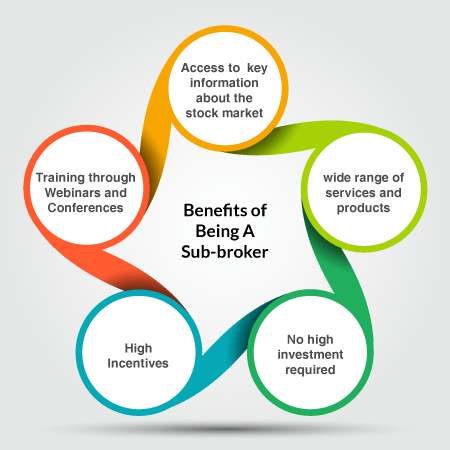What Is Sub-broker And Benefits Of Being A Sub-broker?
The emergence and rapid development of the stock market has created a vast amount of opportunities in the industry for investors to make money. Additionally, the market has grown to progress and develop an industry facilitating this demand, which has resulted in a vast variety of services being offered in the investment industry. From Stock exchanges to brokers, technological advancements have enabled certain processes to be completely digitized. For example, there exist a plethora of discount brokers online that are essentially apps that enable you to trade in the stock market through them, with little to no human intervention. Before this, however, brokers required a means to contact and acquire customers, and thus the role of a sub broker was created. This article will break down the concept of sub brokers alongside an in-depth explanation of what is sub broker, sub broker franchise, how one can become a sub broker and its various benefits.
What Is a Sub Broker?
You have probably heard of a broker, but are probably unaware as to what is a sub-broker. A sub broker carries out the same function a broker carries out, being the middleman between two parties. However, while a stock broker is the middle man between an investor and the stock exchange, a sub broker is the middle man for the stock broker and the investor. Meaning, the job of a sub broker is to mediate between the broker and client. Since in most cases a sub broker works for a stock broker, their job includes bringing clients to the brokerage firm. Additionally, the sub broker assists clients with investing and dealing with securities. In return, you as a sub broker receive a certain cut from the transaction. The more you transact, the more you possibly earn.
Difference Between Sub Broker and Stock Broker
When one asks, ‘what is a stock broker’, perhaps one of the best ways to understand is to compare a broker and sub broker. As mentioned earlier, a sub broker works for or under a broker. However, there are a number of other key factors that differentiate the two.
One of the biggest is that while brokers are listed as trading members of the stock exchange, sub brokers are not. This does not mean that sub brokers do not have any certification from the stock exchange however, as they require a Certification of Registration from SEBI in order to conduct their business.
Another key difference between a broker and a sub broker is that while brokers are paid in brokerage fees, sub brokers are paid in commission. As per law, only brokers who are registered as trading members of the stock exchange are allowed to charge brokerage fees, sub brokers are not. In other words, the broker makes a brokerage fee on every transaction his or her client makes. Of the brokerage fee, the sub broker gets a percentage, which is his commission.
Benefits of Being a Sub Broker

One of the biggest benefits of being a sub broker or being part of a sub broker franchise is the knowledge you gain. Working under a broker provides sub brokers with key information about the stock market that they can use to further their market knowledge and personal trades. While they cannot function as brokers, they can still trade privately with any broker with their own funds. This self-sufficient cycle not only enables sub brokers to cater to their clients better, but also lets them fuel their investments as well.
Another benefit of being a sub broker is that the brokerage firm you work with might also enable you to provide customers with services beyond just investment tips and strategy. For example, some brokers allow their sub broker franchisees to offer clients mutual fund distribution and loan options as well.
A third benefit is that as a sub broker, you do not require a high investment amount, as your franchiser takes care of a majority of the expenses. Sub brokers only require a small investment amount, say 10,000 rupees or above in order to begin their quest as a sub broker.
Conclusion
The role of a sub broker is the result of an increase in demand for brokers as people generate excess amounts of funds and income that they wish to invest. While being a broker requires extensive permissions and certifications, being a sub broker allows you to carry out similar functions, short of being listed as a trading member of the stock market. You can consider partnering with reputed organizations like IIFL securities to smooth your process for the same and make use of their existing expertise.